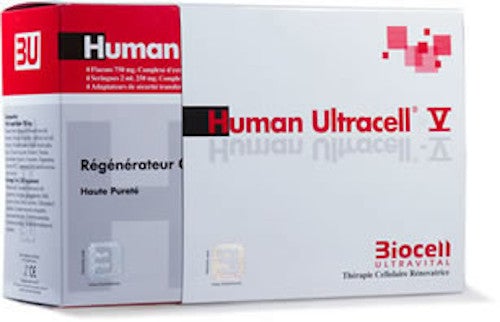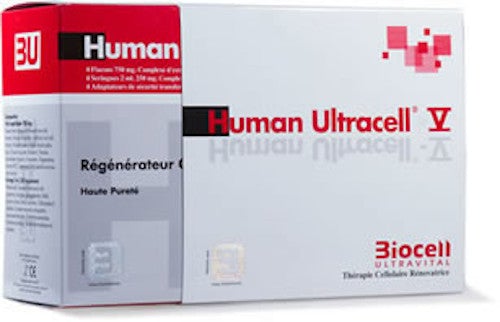Biocell Products
Human Ultracell 3G
Human Ultracell 3G
Couldn't load pickup availability
Problem Over the years, the body's cell functionality is progressively reduced by the effects of free radicals, augmented by the poor quality of life and exposure to chemical and environmental pollution.
These destructive effects result in damage to the production capacity of energy, proteins and enzymes and lead to the accumulation of undesirable biological material into cells. The damage could affect the cell DNA and lead to degenerative diseases and accelerated aging. Solution Induce a cell renewal process, which allows: Recycling undesirable biological material accumulated in the cells (autophagy) . Mitochondria recovery to restore its energy production capability. Normalizing the control functions of DNA transcription process, preventing the possibility of mutations. Neutralize the effects of free radicals.
Problem
- Over the years, the body's cell functionality is progressively reduced by the effects of free radicals, augmented by the poor quality of life and exposure to chemical and environmental pollution.
- These destructive effects result in damage to the production capacity of energy, proteins and enzymes and lead to the accumulation of undesirable biological material into cells.
- The damage could affect the cell DNA and lead to degenerative diseases and accelerated aging.
Solution
Induce a cell renewal process, which allows:
- Recycling undesirable biological material accumulated in the cells (autophagy) .
- Mitochondria recovery to restore its energy production capability.
- Normalizing the control functions of DNA transcription process, preventing the possibility of mutations.
- Neutralize the effects of free radicals.
Action Mechanism
The coenzymes NAD high content, together with mitochondria proliferation inducers contribute almost immediately to increase cellular energy production, which allows cells to develop an autophagy process, a cell cleaning process to recycle the unusable biological material accumulated in their cytoplasm.
With the gradual recovery of the energy production capacity and the effects of growth factor stimulating cytokines, a cellular function normalization process begins, particularly its protein production machinery and its DNA transcription controls, to avoid mistakes leading to dangerous mutations.
Normalizing the protein production capacity, leads to increased muscle mass, increased collagen in the skin, joints, connective tissue, etc.
Furthermore it improves cognitive functions, memory, etc. and stimulates the immune system.
Ingested formula components arrive intact to intestinal villi, thanks to the protection of the enteric layer and from there go into the bloodstream to be selectively incorporated by the cells via various means of cellular transport, depending on the size of molecules such components. Large molecules are incorporated by endocytosis and the smaller molecules are incorporated by simple diffusion or diffusion provided by receptor proteins, as appropriate.
The useful parts of the cell extracts are recycled and used in cells. The parts that are not useful are eliminated and expelled outside the cell.
The incorporation of the various components to the corresponding cell tissues is facilitated by the empathy developed by Biocell Laboratories between these components and the receptor proteins on the cell membrane surface.
Dosage:
Human Ultracell V (Oral Dose) is administered in 3,000 mg daily dosages per day, corresponding to six (6) individual 500 mg units of prolonged release capsules and/ or tablets.
These daily dosages are conveniently packaged in single dose vials which should be consumed completely once opened.
Treatment is designed to be consumed in three stages over ten (10) day periods totaling thirty (30) days to complete.
The individual ten (10) day formulas will be labeled with numeric packaging: HU1, HU2 and HU3 and are designed to be taken consecutively over thirty (30) days.
Share


